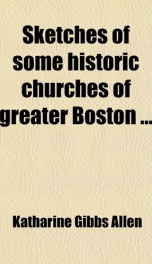sketches of some historic churches of greater boston

Purchase of this book includes free trial access to www.million-books.com where you can read more than a million books for free. This is an OCR edition with typos. Excerpt from book: FIRST PARISH AND FIRST CHURCH IN CAMBRIDGE The spirit of Puritanism is as old as the truth and manliness of England. Protestantism in the Massachusetts Colony represents the period when the Puritan party in the Church of England, having loyally held its place through three hostile reigns, was driven at last from its allegiance. Those who stayed in the Church of England, unwilling to become Separatists, called Puritans in derision, finally were forced to go to the western world. They were of that brotherhood of men, who by force of social consideration, as well as of intelligence and resolute patriotism, moulded the public opinion and action of England, in the first half of the sixteenth century. The Puritan claimed that obedience toward God set bounds to the authority of men. It was the independence of the planet which claims a large orbit, yet never dreams of breaking from the central sun. During the entire reign of Elizabeth, the reform party constituted quite half the clergy within the church. In 1562, the proposal to set aside surplices, to give up kneeling in prayer, the use of organs, and the sign of the cross at baptism was lost by a vote of fifty-eight tofifty-nine, the deacons and arch-deacons being among the minority. In James I's reign nearly one thousand English clergy petitioned extensive changes in the service, which were prevented by the King's intolerance. John Cotton preached twenty years as an avowed Puritan hi Boston, England, discontinuing the liturgy and vestments, and denying the authority of the bishops. Yet he declared that he was no Brownist, and called the Independent too straight. Governor Winthrop said: "We esteem it an honor to call the Church of England our dear mother," and spoke in strong disapproval of those who in England went under the name o...
Info about the book
Author:
Series:
Unknown
ASIN:
B00087K9FG
Rating:
4/5 (1)Your rating:
0/5
Languge:
English
Users who have this book
Users who want this book
What readers are saying
What do you think? Write your own comment on this book!
write a commentif you like sketches of some historic churches of greater boston try:
Other books by this author
Do you want to read a book that interests you? It’s EASY!
Create an account and send a request for reading to other users on the Webpage of the book!

